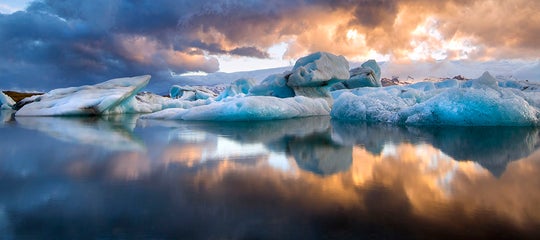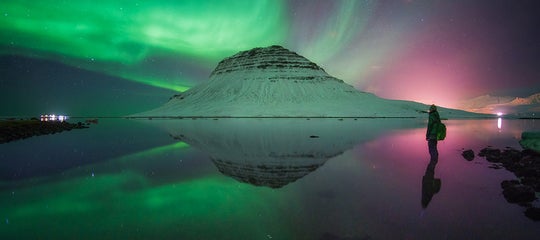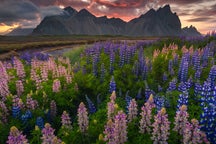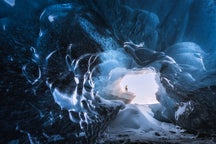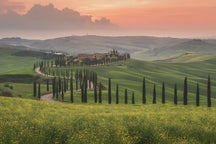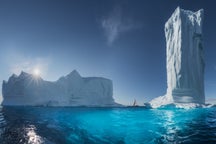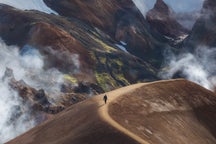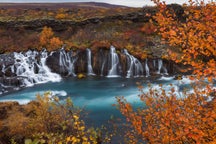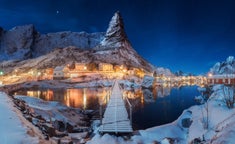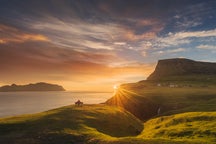
Basalt columns are a fascinating land formation that photographers are easily drawn to. When in small numbers, the multiple stacks of hexagonal rocks often form an ideal foreground or background for landscape photography.
These columns’ regularity is stunning and almost unbelievable and can often be mistaken for man-made creations rather than a part of solidifying lava or creation of Mother Nature. The visual experience is often so unique that their regularity is often described as magical. When you add the basalt column to other phenomena in nature, like a stream of spring fed water or colourful vegetation, the experience often becomes “other worldly.”
Larger Picture
Iceland has many places that have gorgeous formations of basalt columns. Because of frequent volcanic activity and the geologically young age of the island, it possibly has more basalt column sites than any other place on the planet.
In addition to small stacks of basalt columns, there are also places that have large formations—places that transform the experience from “other worldly” to mystical. In those places, the basalt columns become the main object of photography, and other items such as vegetation, a river, or people form the foreground or background.
One of the most interesting basalt columns in Iceland is the large, newly discovered Stuðlagil Canyon.
Interesting Photographic Items of Stuðlagil Canyon
Stuðlagil is actually a canyon packed with large basalt column stacks. There are also different formations such as a small basalt rock in the middle of the canyon, visual hexagonal tops of basalt column stacks at the banks by the riverbed, various colour formations in the stacks, and different sizes that spread on both sides.
The green vegetation surrounding the canyon and the turquoise of the river that floats through the canyon give colour to the entire structure, making it an irresistible subject for photographers.
 Stuðlagil Canyon in Jökla. Photo by: 'Einar Páll Svavarsson'.
Stuðlagil Canyon in Jökla. Photo by: 'Einar Páll Svavarsson'.
Why Was Stuðlagil Just Recently Discovered?
When I visited Stuðlagil in early August 2016, almost no one had ever been there. I studied the place thoroughly, talked to local people, and read articles just to understand why no one had discovered this unique place yet: It was owing to the big dam and reservoir built in the highlands south of the canyon and its home, the Jökuldalur valley.
The dam and the hydroelectric project had moved the glacial river Jökla, the second largest river in Iceland, to another valley, and the river subsequently became a smaller collector of spring-fed streams. This not only changed the colour of the river but also, more importantly, lowered the water level, revealing the basalt column that had been hidden for centuries.
When is the Best Time to Take Photos in Stuðlagil Canyon?
Photographers visiting Iceland often prepare their visit and tours moths in advance. It is essential to visit a place like Stuðlagil at the right time.
The large reservoir in the highlands fills up around the middle of August, and the milky and brownish glacial water starts to flow through the river path again, changing the colour of the river and increasing the level of water in the canyon. So, the best period for a photographer to visit Stuðlagil is from the middle of June until the middle of August, preferably from late July to the first week of August.
It is a short window, but it is then that we have daylight for at least 20 hours. The canyon and the basalt columns are beautiful during spring, summer, and autumn also, but for photographers, this is the time for magic.
 Stuðlagil basalt column canyon in Jökuldalur. Photo by: 'Einar Páll Svavarsson'.
Stuðlagil basalt column canyon in Jökuldalur. Photo by: 'Einar Páll Svavarsson'.
How to Visit Stuðlagil Canyon?
Stuðlagil is in the north east region of Iceland, between Egilsstaðir in the east and Mývatn in the north. Access to Stuðlagil is relatively easy. After turning south on Ring Road no. 1 by Skjödólfsstaðir guest house on to road no. 923, you drive to the farm Klaustursel for about 14 kilometres.
As a photographer, you do not want to go to the more popular site, the farm Grund on the west side of the river. At Klaustursel farm, you will find a bridge on the river Jökla to go over to the east side. After passing that bridge, hike south on the track for about four kilometres to the Stuðlagil Canyon.
It is recommended to make a stop after two kilometres by one of the most beautiful basalt column waterfalls in Iceland, Stuðlafoss. When you reach Stuðlagil, climbing down to the river in the canyon is possible at one spot but requires careful ascending without being particularly difficult.
 Stuðlafoss waterfall in Jökuldalur. Photo by: 'Einar Páll Svavarsson'.
Stuðlafoss waterfall in Jökuldalur. Photo by: 'Einar Páll Svavarsson'.
Once down by the river, it will feel like you have entered a magical place. The stones and rocks are occasionally slippery, so be careful.
The hike both ways is about 8 kilometres, and the time you will need in the canyon is probably one to two hours. For photography, it is recommended to be in the canyon in the morning. An excellent way to plan this visit is to get an early morning start.
About the Author: Einar Páll Svavarsson is a landscape photographer based in Iceland. You can find more of his work on his website, or by following him on 500px.
Are you ready to get off the beaten track in Iceland? Join us on a an incredible adventure camping for 6 days in the Icelandic Highlands.


